We began the day with a drive westward through the Blacktail Deer Plateau. There is a rock jumble near the junction of the Grand Loop Road and the Blacktail Deer Plateau Road, and in this area we often have seen yellow-bellied marmots. The best chance for viewing this industrious animal is on brightly clear chilly mornings – they seem to favor basking in the sun from a vantage with readily accessible escape routes. The images above and below were recorded at 08:00 MDT, using the Nikon D4 and the AF-S NIKKOR 200-400mm f/4G ED VR II at 400mm. Exposures were at f/5.6 and 1/2500s, ISO 800. Handheld (invariably, ’cause that is why you buy this lens!!!). The light changes rapidly in the early morning and I was caught a bit off-guard – thus the silly shutter speed (1/500s would have been plenty fast enough).
We continued further on down the road, and past Tower Junction to the Northeast Entrance Road. We made a low-probability pass along the access road to Slough Creek Camp. Near the south end of the road we found a small group of pronghorns basking in the morning sun. The image of a young female (Below) was recorded at 09:00 MDT using the D4 and the 200-400mm f/4.0 VR II at 400mm. Exposure was f/5.6 and 1/2500, ISO 500.
Slough Creek Campground had not yet opened at the time of our visit, however it was clear that the mounted brigade was fully active. Images of the horse barn located near the campground (three images below) were recorded at between 09:15 and 09:30 MDT, using the D800E and the AF-S NIKKOR 24-70mm f/2.8G ED lens lens at various focal lengths.
A uinta ground squirrel kept a cautious watch over us while we milled around near the Slough Creek trailhead. The two images below were recorded at 09:30 MDT, using the D4 and the 200-400 lens at 400mm. Exposures were f/5.6 and 1/600s, ISO 500.
We continued eastward through the Lamar Valley to the northeast entrance of the park without spotting a single animal – it’s like that some days… From here we continued along the Beartooth Highway almost to the summit. The image below of Index Peak was recorded at 11:07 MDT, using the D800E and the AF-S NIKKOR 70-200mm f/2.8G ED VR II lens at 140mm. Exposure was f/8.0 and 1/320s (+0.33 EV), ISO 100.
The road was closed just a few yards beyond the point were I made this shot (looking north). Image recorded at 11:40 MDT, using the D800E and the 24-70mm lens at 52mm. Exposure was f/8.0 and 1/500s (+0.33EV), ISO 100.
A Google Earth image of the location at which the shot above was recorded is shown below – exact center of the image:
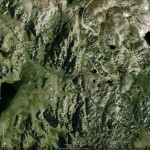
On our westward retreat we stopped at the Lily Lake Campground, where I recorded the image of Index Peak shown below. Image recorded at 13:00 MDT, using the D800 and the 24-70mm lens at 38mm. Exposure was f/11.0 and 1/125s (+0.33EV), ISO 100.
Then back through the Lamar Valley, and then through the Tower junction. Just a short drive west from the junction at Elk Creek Meadows we found a sow black bear (below) and two second-year cubs. From the road to the position of these bears is several hundred meters – the image below is a modest crop of the original image. Image recorded at 15:00 using the using the D800E, the AF-S NIKKOR 600mm f/4G ED VR, and the AF-S Teleconverter TC-17E II, producing an effective FX focal length of 1000mm. Exposure was f/6.7 (minimum value with the TC-17) and 1/1000s, ISO 500.
We then continued traveling westward all the way back to Mammoth Hot Springs – no animals. We decided to drive south towards Norris. Near the Grizzly Lake Trailhead we encountered the local resident shown in the following five images. The top two images were recorded at 17:00 MDT, using the D800E, the 600mm f/4G ED VR, and the TC-17E II. Exposures were f/6.7 and 1/1000s, ISO 1250.
The previous two images were recorded with Griz on the east side of the the Grand Loop Road. Although the growing crowd was well-behaved, it became evident that Mr. Griz wanted nothing more than to cross the roadway – as anyone who has ever been present at the big show will attest, there are no (none, zero) gaps in the crowded mass of folks viewing the bear, and thus the bear crossing is a significant hazard for both bear and people. Remarkably, the bear veered north along the road, then quickly west across the asphalt at the first opportunity. The point at which the bear crossed was bounded on the west side by steep high ground, which forced Mr Griz along the inside track along the west side of the Grand Loop Road, within approx 10-30 ft (yeah, ft) of the assembled masses. Discretion being the better part of valor, I jumped into the passenger side of the truck cab, picked up the D4 + 200-400mm, and commenced to reel-off images as Griz wandered by. The next three images were recorded at f/5.6 and 1/1000s, ISO 1600.
This entry was mastered using an NEC model PA301W monitor calibrated to 140 candelas per meter-squared (cd/m^2).
Copyright 2012 Peter F. Flynn. No usage permitted without prior written consent. All rights reserved.
Tags: Antilocapra americana, Beartooth Highway, Blacktail mDeer Plateau, Grizzly Bear, Grizzly Lake Trail, Index Peak, Marmota flaviventris, Pronghorn, Slough Creek, Uinta Ground Squirrel, Urocitellus armatus, Ursus arctos horribilis, YELL, Yellow-Bellied Marmot, Yellowstone National Park, YNP
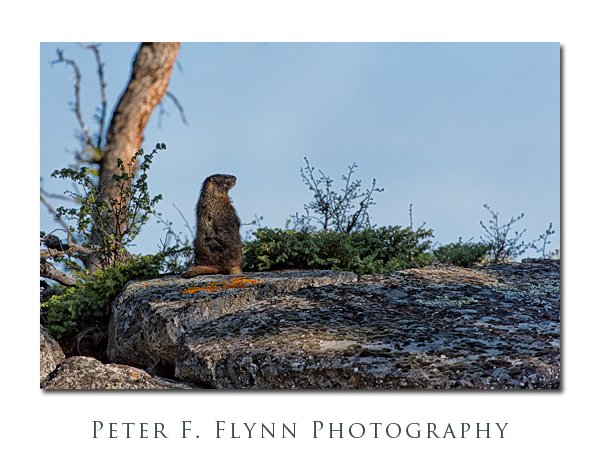
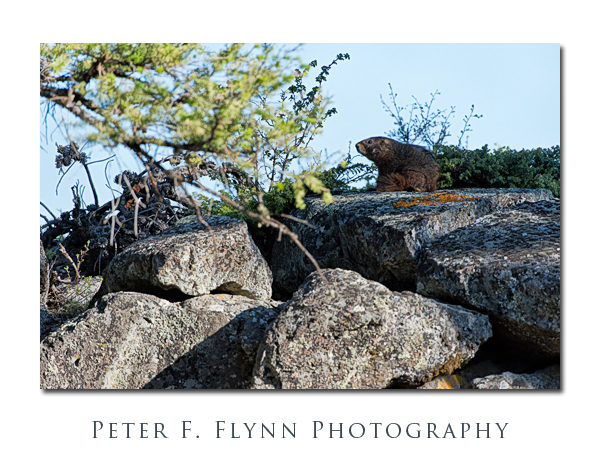
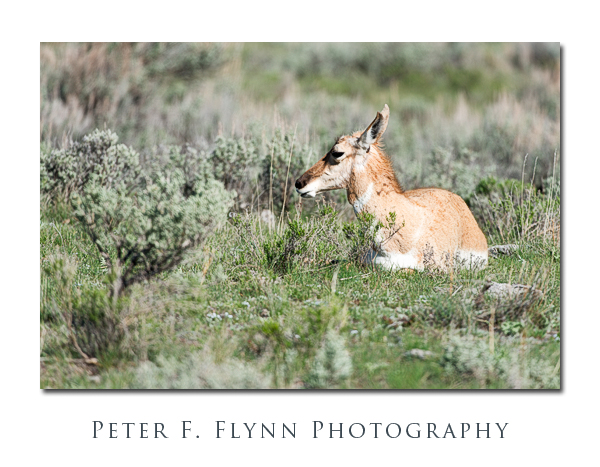
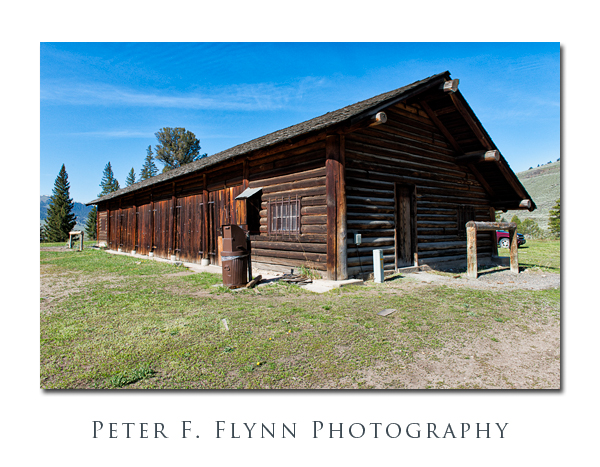
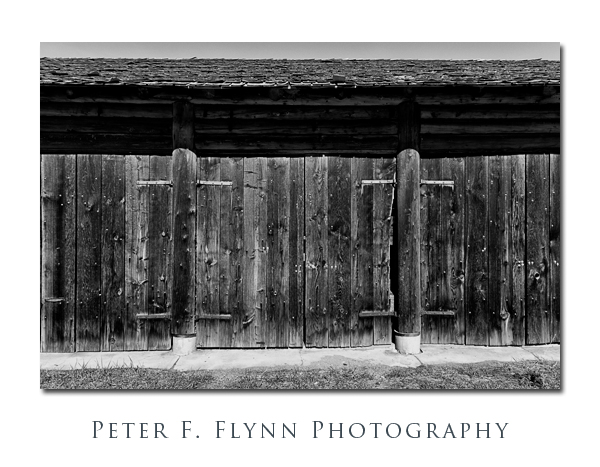
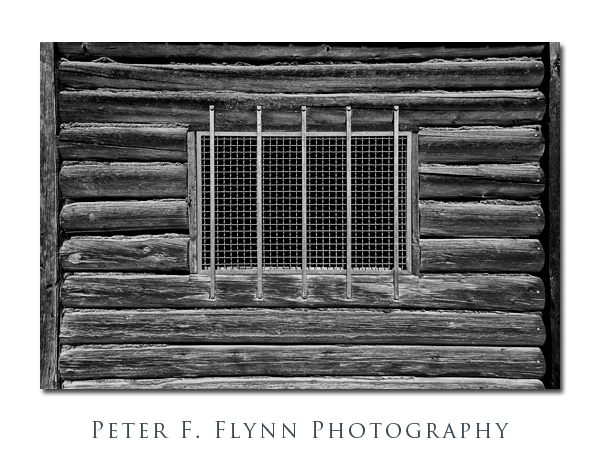
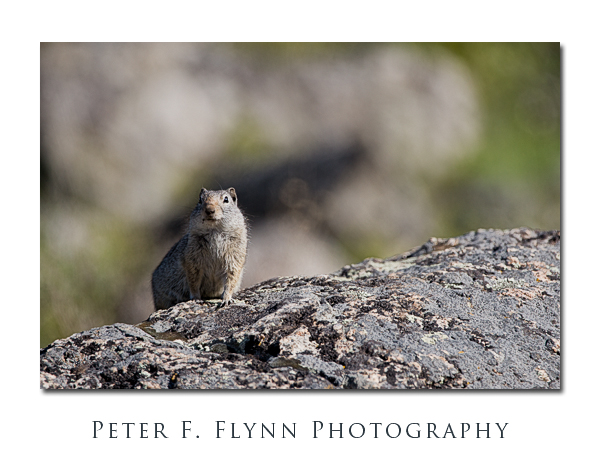
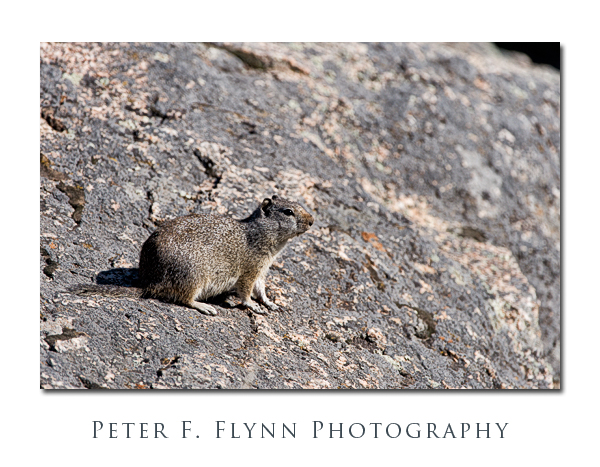
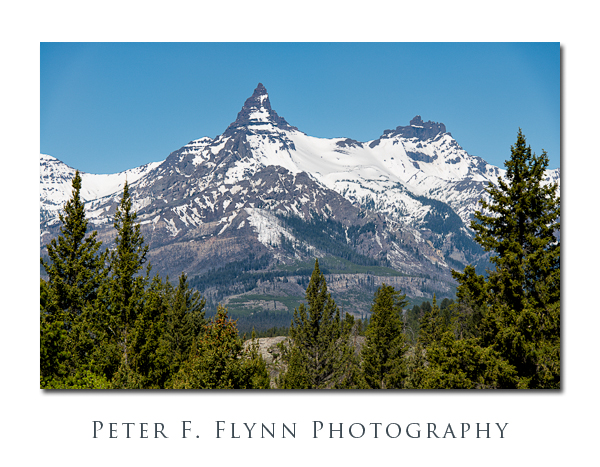
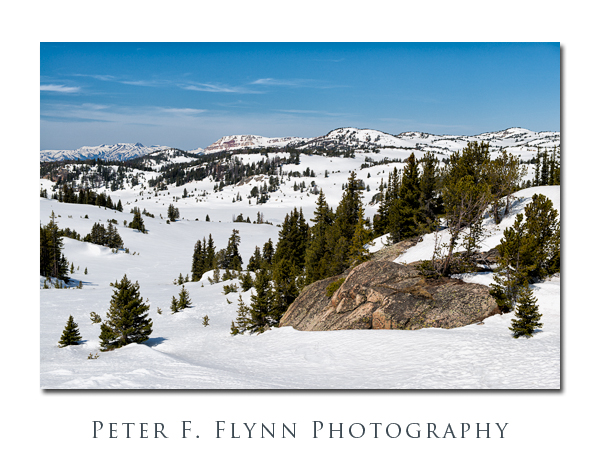
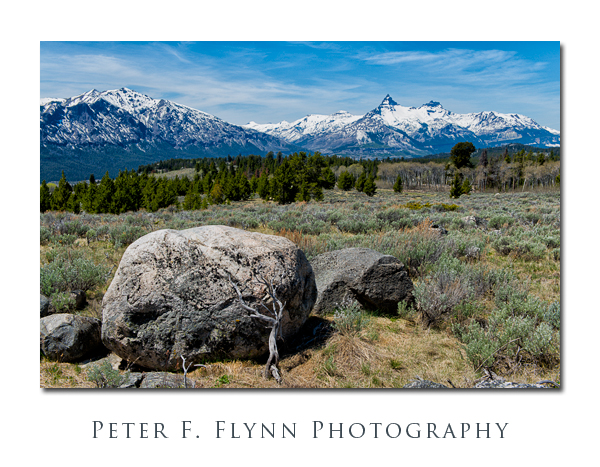
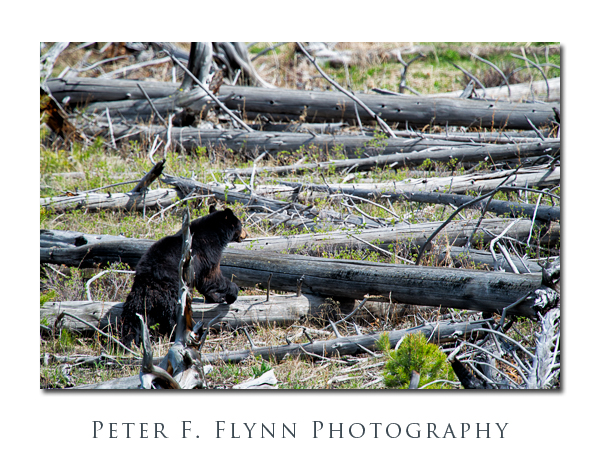
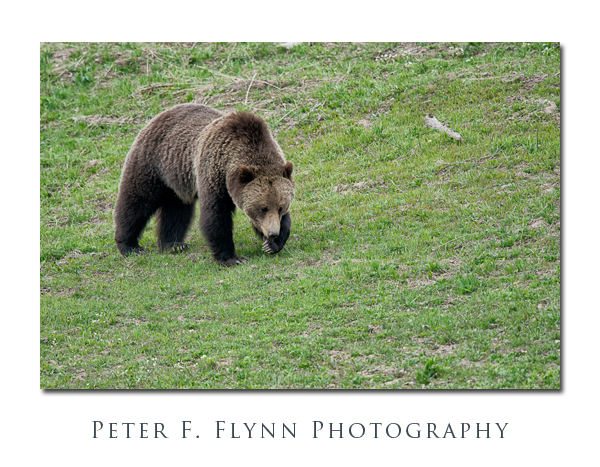
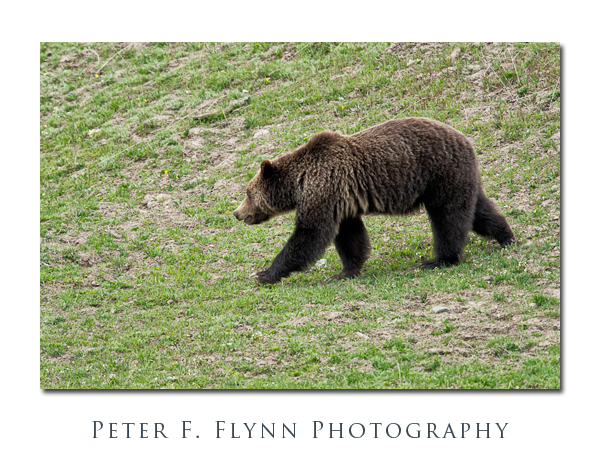
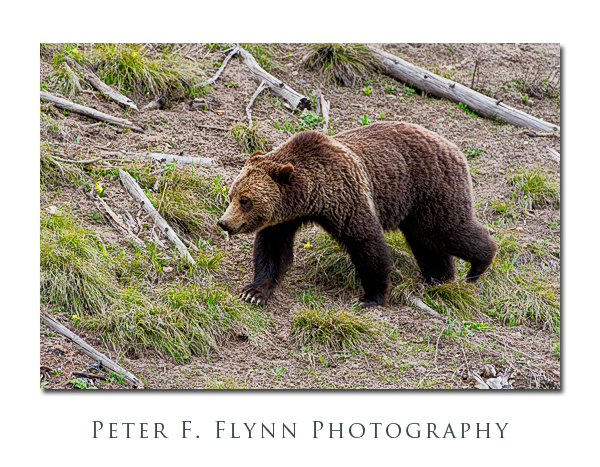
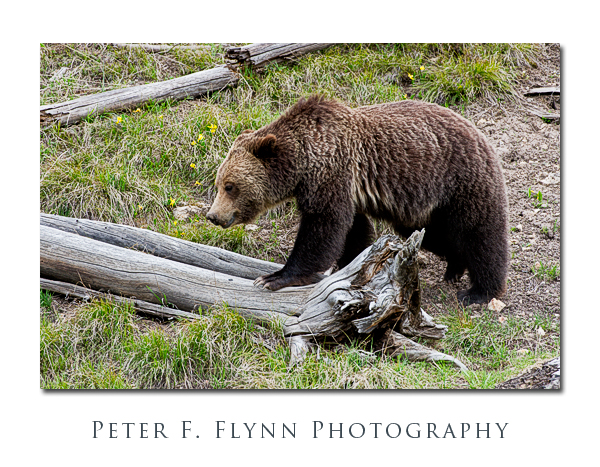
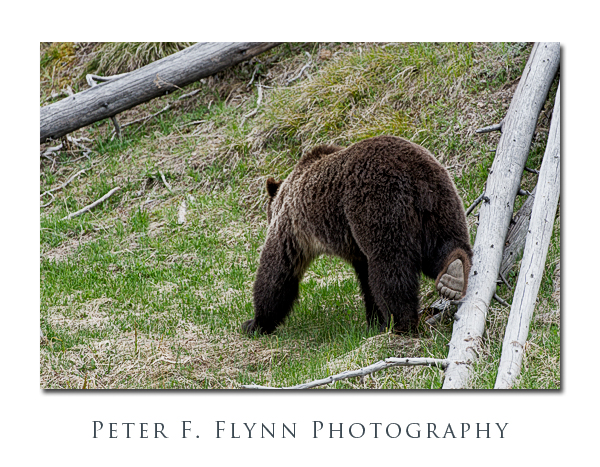
Day two sure was full of variety and excitement. Great shots, love the black and white series. Ol Griz was a little close for Don Pedro huh, that would have been fun to see you hop in a car at a fast pace. The bear sequence is nice, love the one with his rear foot (paw?) showing.
Hi B,
Although I am always quite prepared to make a mad dash for cover, in this particular instance we rather anticipated the track of the bear well in advance of his passing. My main concern was that some knucklehead might spook Mr Griz from his natural path, and thus mess up my hustle. Got lucky on this one.
Cheers,
P.